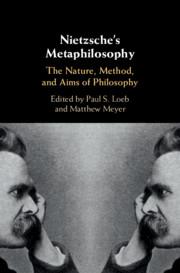Book contents
- Nietzsche’s Metaphilosophy
- Nietzsche’s Metaphilosophy
- Copyright page
- Contents
- Contributors
- Acknowledgments
- Note on Texts, Translations, and References
- Abbreviations
- Introduction
- Part I Evolving Metaphilosophies
- Chapter 1 Metaphilosophy and “Natural History”
- Chapter 2 The Dialectics of Nietzsche’s Metaphilosophies
- Chapter 3 Nietzsche as Metaphilosopher
- Part II The Nature of Philosophy
- Part III The Method of Philosophy
- Part IV The Aims of Philosophy
- Bibliography
- Index
Chapter 3 - Nietzsche as Metaphilosopher
from Part I - Evolving Metaphilosophies
Published online by Cambridge University Press: 24 October 2019
- Nietzsche’s Metaphilosophy
- Nietzsche’s Metaphilosophy
- Copyright page
- Contents
- Contributors
- Acknowledgments
- Note on Texts, Translations, and References
- Abbreviations
- Introduction
- Part I Evolving Metaphilosophies
- Chapter 1 Metaphilosophy and “Natural History”
- Chapter 2 The Dialectics of Nietzsche’s Metaphilosophies
- Chapter 3 Nietzsche as Metaphilosopher
- Part II The Nature of Philosophy
- Part III The Method of Philosophy
- Part IV The Aims of Philosophy
- Bibliography
- Index
Summary
In this chapter, I first examine two metaphors – the astral and the entomological – that extend through Nietzsche’s entire corpus to track the development of certain key themes in Nietzsche’s metaphilosophical reflections as they evolved from the early days of his professorship at Basel up to the mature writings of 1886 and 1887. By then, I argue, Nietzsche’s metaphilosophical meditations had crystallized around his critique of the so-called will to truth. I then argue that key to this critique is Nietzsche’s conviction that philosophical “knowledge” is not just different in kind to the type of knowledge produced by scholars and scientists, but that the two have contrary properties. Finally, I make use of these results to mount a Nietzschean metaphilosophical critique of the now prominent analytical reception of Nietzsche. A sizable share of contemporary English-language philosophical work on Nietzsche, I argue, is not just metaphilosophically discontinuous with Nietzsche’s understanding of and approach to philosophy, but expressive of deep-set resistance to precisely those transformations in philosophy that Nietzsche sought to bring about as an engaged metaphilosopher.
- Type
- Chapter
- Information
- Nietzsche's MetaphilosophyThe Nature, Method, and Aims of Philosophy, pp. 42 - 62Publisher: Cambridge University PressPrint publication year: 2019



